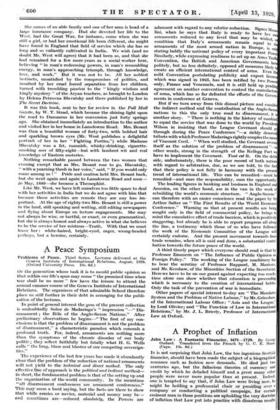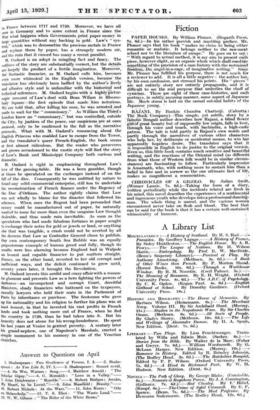A Prophet of Inflation IT is not surprising that John
Law, the too ingenious Scottish financier, should have been made the subject of a biographical romance such as fashion now demands. He died just two centuries ago, but the fallacious theories of currency and credit by which he deluded himself and a great many other people were never more popular than at present. Indeed, one is tempted to say that, if John Law were living now, be might be holding a professorial chair or presiding over a company or conducting a political campaign, for certain eminent men in these positions are upholding the very doctrine of inflation that Law put into practice with disastrous results
•
in France between 1717 and 1720. Moreover, we have all seen in Germany and to some extent in. France since the War what happens when Governments print paper money in ' sage quantities without any backing in gold. Law's " sys- tent" whieh was to demonetize the precious metals in France and replace them by paper, has a strangely modern air, and the ruin that it caused has many a recent parallel.
M. Oudard is an adept in mingling fact and fancy. The outlines of the story are substantially correct, but the details are largely the product of a fertile imagination. Moreover, the fantastic financier, as M. Oudard calls him, becomes even more whimsical in the English version,, because the translator has obviously been baffled by the author's- lively
and allusive style and is unfamiliar with the 'historical and technical references. M. Oudard begins with 'ii highly-Pictur-
erpie account of Law's duel with Beau Witsen in Blooms-
suiy Square-the first episode that made him notorious. We are told that, after killing his man, he was arrested and
made to wait for the " commissary." As William the Third's London knew no " commissary," but was controlled, outside the City, by justices of the peace, our suspicions are at once aroused, only to be confirmed to the full as the narrative proiceeds. What with M. Oudard's romancing about the English Princess who enabled Law to escape from the Tower,
and the translator's queer French-English, the book seems at first almost ridiculous. But the reader who perseveres and grows accustomed to the exotic style will find the story of Law's Bank and Mississippi Company both curious and dramatic.
M. Oudard is right in emphasizing throughout Law's love of the gaming-table. He was a born gambler, though
at times he speculated on the exchanges instead of on the fall of the dice. Consequently he was unfitted by nature to found any solid commercial enterprise, still less to undertake the reconstruction of French finance under the Regency of the Due d'Orleans. The author rightly claims that Law was not wholly to blame for the disaster that followed his schemes. When once the Regent had been persuaded that
money could be manufactured out of paper, he naturally wanted to issue far more than even the sanguine Law thought deiirable, and thus made ruin inevitable. As soon as the speculators who had made fabulous fortunes in paper sought to exchange their notes for gold or jewels or land, or anything else that was tangible, a crash could not be averted by all the decrees that Law as Controller General chose to publish. Our own contemporary South Sea Bubble was an equally preposterous example of human greed and folly, though its results were less alarming because England had in Walpole an honest and capable financier to put matters straight. France, on the other hand, reverted to her old corrupt and inefficient ways, and the deficit continued to grow until, seventy years later, it brought the Revolution.
M. Oudard invests this sordid and crazy affair with a roman- tic glamour and presents Law as a hero fighting the powers of darkness-an incompetent and corrupt Court, deceitful Ministers, shady financiers who battened on the taxpayers, rascally lawyers who held their seats in the Parlement of Paris by inheritance or purchase. The Scotsman who gave up his nationality and his religion to further his plans was at least honest, in that he invested his vast profits in French lands and took nothing more out of France, when he fled the country in 1720, than he had taken into it. But his honesty does not atone for his wrong-headedness. He spent his last years at Venice in genteel poverty. A century later his grand-nephew, one of Napoleon's Marshals, erected a simple monument to his memory in one of the Venetian churches.



















































 Previous page
Previous page